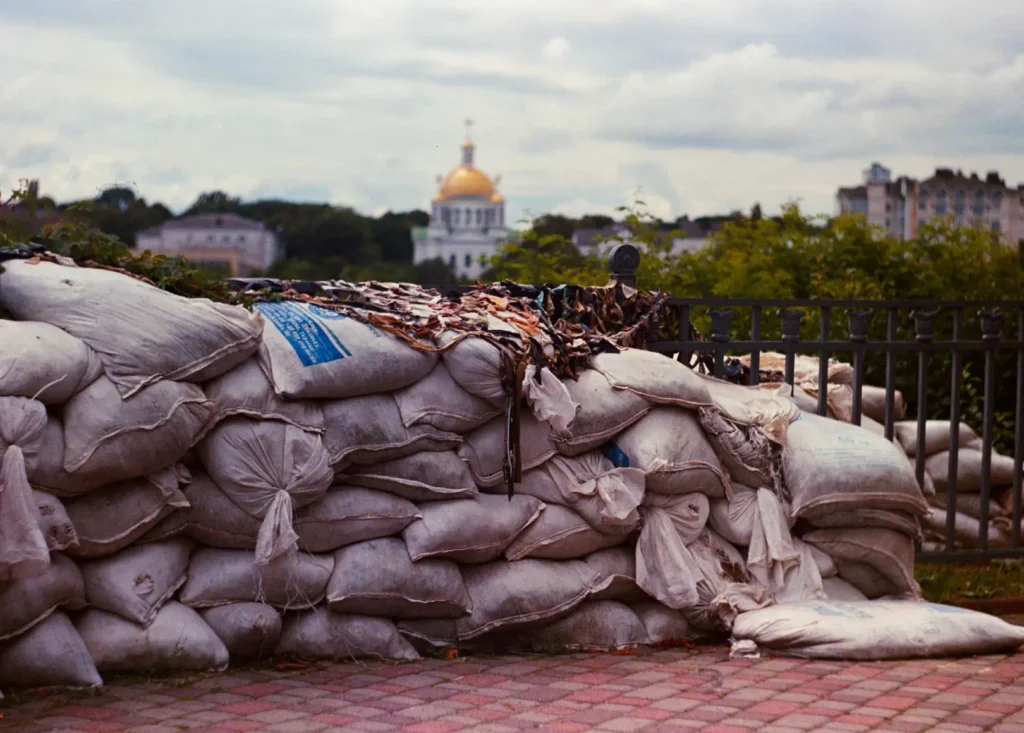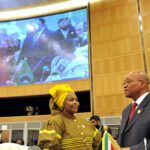A year has passed since Russia’s invasion of Ukraine and the war looks set to drag on deep into this year. While European leaders shifted their focus onto Ukraine, Africa has felt the sharp consequences of the war, while continuing to face wider existing challenges. It has undoubtedly had significant implications for the Africa-Europe relationship.
The recent evolution of the relationship
In March 2020, European Commission President Ursula von der Leyen consolidated Africa on the European agenda through the report ‘Towards a comprehensive strategy with Africa’ where Europe committed to strengthening the Africa-Europe partnership. Despite reported strains in the relationship exacerbated by the Covid-19 crisis, the most recent EU-AU summit last year rebooted the dialogue and showed commitment to A Joint Vision for 2030.
Since this milestone, however, Russia’s war in Ukraine has had major implications for the world at large and indeed the relationship between Europe and Africa.
Most recently, the UN General Assembly vote last month demanding immediate Russian withdrawal from Ukraine highlighted divisions among the African bloc and relationships with Europe. Several of the countries that abstained were in Africa, including Ethiopia, Guinea, Mozambique, South Africa, Sudan, Uganda, Zimbabwe, and the Republic of the Congo.
Implications for power relations
The rapidly evolving context has inevitably had significant implications for power relations globally, including on African-European dynamics. Africa and many Southern governments are paying a high price for the continuation of the war and are estimated to lose a decade of growth. It has been reported that many Southern governments are tired of the side-lining of the UN and the sense that the war is being treated as a zero-sum game.
As a result of this disillusionment, governments are opting to make decisions based on self-interest and hedging bets within the context of an uncertain future – by securing their interests with non-Western alliances. For example, many are bypassing sanctions and finding new trade routes and payment systems such as avoiding using Swift.
It should also be recognised that Africa’s choice of partnerships has evolved in recent years – from China’s Belt and Road Initiative (BRI) to the US Strategy toward sub-Saharan Africa launched at the end of last summer. The EU-AU relationship is therefore just one opportunity for the continent, amongst others.
Disinformation and implications for public attitudes
The rise of disinformation since the war began has also impacted the African-European relationship. Disinformation campaigns have pushed the narrative that Russia has no colonial legacy in Africa and is a long-time friend of African people fighting against imperialists and colonialists. Interestingly however, recent research by the South African Institute of International Affairs (SAIIA) suggests division between some African governments and their citizens, who tend to be more wary of associating with Russia.
The ongoing complexity of energy justice
It’s also impossible to overlook how the energy debate is affecting relations between the continents. This has moved further up the political agenda since the outbreak of the war. As Europe looks to transition away from Russian gas, according to EU Climate chief Frans Timmermans, Africa is likely to be Europe’s most important partner as it seeks to increase its renewable energy supply and switch to green hydrogen. However, there is much discussion around whether African produced resources such as hydrogen should be utilised within the continent or exported elsewhere. More broadly, the speed in which Africa transitions itself to cleaner energy is a source of much debate.
Implications on food (in)security
Finally, the impact of the war on food security has undoubtedly affected dialogue around the relationship. Although food insecurity had been worsening in Africa well before the invasion started, there is a general consensus that it has deepened insecurity, putting pressure on Europe to address this issue.
A shared positive agenda: three ideas to respond to the new context
Africa and Europe have been confronted with major emergencies in recent years, from Covid-19 to the war in Ukraine. These challenges have impacted the trust and partnership, but have also brought opportunities for collaboration. This new context offers a moment to reshape the agenda with a stronger focus on shared concerns and shift from “how Europe can help Africa” to “how Africa and Europe can work together”.
Three proposed ways forward:
National action to strengthen continental relations: Given these shared challenges, one idea to strengthen the relationship is for individual countries to increase the momentum. For example, considering the strong interest of President Emmanuel Macron in Africa, France could apply more pressure on the EU to deliver on its Africa agenda and move forward with shared goals. Likewise, African countries could be putting more pressure on the AU to act.
Additionally, the Africa-Europe relationship can no longer be shaped by the neighbouring countries (the Mediterranean) or those with a colonial past (France, Germany, Belgium, Portugal, Netherlands and Italy). It is time to give more space to other European and African countries to increase their bilateral engagement across the continents, such as Poland and the Baltic states. This will lead to a more diverse and inclusive approach with better results.
Counter dis/misinformation: Since the war began, a wide range of tools have been quickly developed to help audiences tackle disinformation. These should be rolled out where possible.
Simultaneously, the EU banned the channels Sputnik and RT for fake information propaganda about Ukraine. However, the most effective way to counter misinformation is in the promotion of reality. The accumulation of lived experiences exposes the gap between the disinformation and truth.
Strengthen diplomacy: A final way to strengthen the relationship is through systematic and long-term efforts including training of diplomats and officials, building diplomatic services and other infrastructures and strengthening regional cooperation through the African Union.
The next AU-EU Summit is yet to be scheduled, but there is no doubt that it offers an opportunity for both unions to reshape their agenda and work together on shared challenges.
Author: Laia Aycart-Piquer (ODI) and Dora Meredith (ODI)
Photo by Margarita Marushevska on Unsplash





